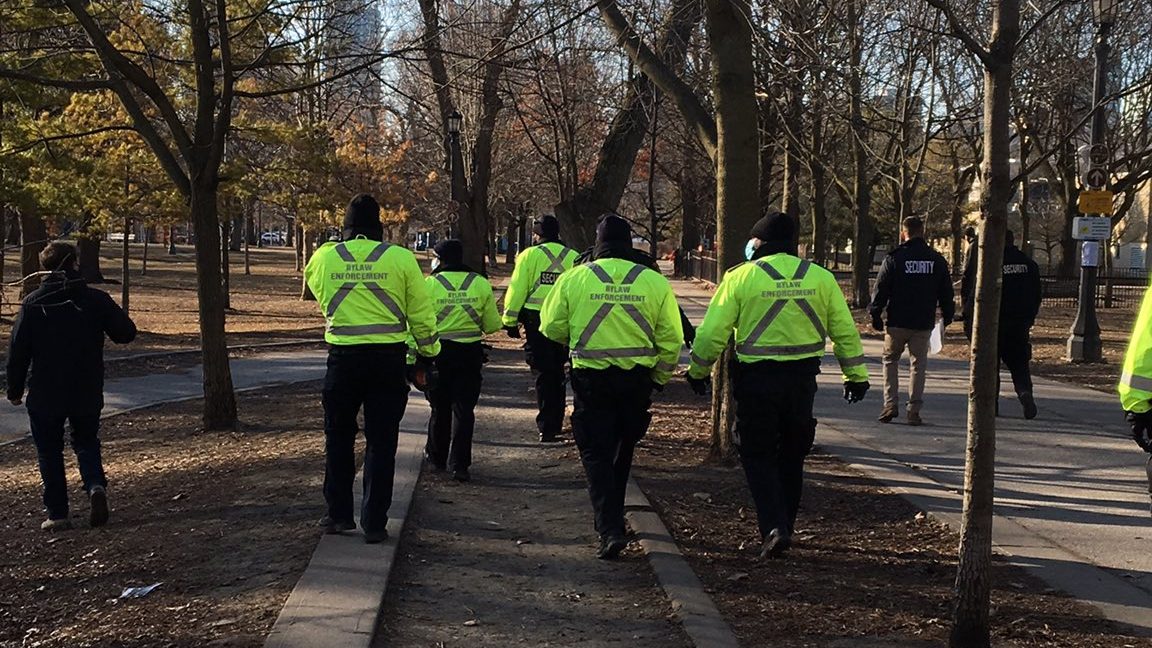Fact: A key component of the City’s Pathway Inside program is the criminalization of unhoused people. Criminalization,1 increases in policing, and the threat of incarceration endangers the health and safety of encampment residents rather than promoting health and safety.
On March 19th, 2021, three days after the City’s announcement of the Pathway Inside program, at least seven corporate security guards and by-law enforcement officers employed by the City of Toronto issued trespass notices in Trinity Bellwoods Park informing encampment residents that they will be in violation of the Trespass to Property Act if they do not clear the park by 8:30 am April 6th. The notices were posted on tents and poles.2 Similar notices were posted in other parks in the city.3 These notices were served “to guide peoples’ decision making” in relation to the Pathway Inside program.4 Enforcement of the Trespass to Property Act compels an increase in police presence, which further criminalizes homelessness, undermines the health and safety of encampment residents,5 and further increases encampment residents’ risk of of being subject to large fines, incarceration and deportation.6

FACT: Two weeks after the City announced the Pathway Inside program, promising “safe” and “comfortable” shelter-hotel spaces, the hotel being used for the program experienced a COVID-19 outbreak. As a result of the outbreak, the shelter-hotel stopped accepting new residents and the City notified the public (but not encampment residents) that “no enforcement action to vacate parks will occur on April 6.”7 People who had already moved from encampments to the shelter-hotel weren’t notified of the outbreak until 3 days later.8
Notes:
City Claim: Deputy Mayor Michael Thompson (Scarborough Centre), Chair of the Economic and Community Development Committee in City of Toronto. (March 16, 2020). City of Toronto supporting people living in encampments with safe, supportive indoor space.
- For more on the criminalization of homelessness, see: Factcheck Toronto. (April 8, 2021). Claim: Parks Ambassadors.
- Johnston Hatlem, Doug. (March 19, 2021). Twitter post; Cook, Greg (March 19, 2021). City of Toronto Trespass Notice (Allan Gardens) ; Cook, Greg. (March 19, 2021). City of Toronto Trespass Notice (Moss Park).
- Factcheck Toronto. (March 21, 2021). “Claim: Pathway Inside, a new City program…”. Previous evictions have used “Notices of Advice,” as prescribed under the municipal by-laws. The notice provided to encampment residents is a notice under the Trespass to Property Act, a provincial regulatory offense. E.g. Moss Park Notice of Advice in July 2020. Dodd, Zoe (July 15, 2020). Twitter post.
- City of Toronto. (April 1, 2021). Pathway Inside program continues to house and support people experiencing homelessness.
- Policing reduces access to harm reduction services and activities, which can undermine people’s health and put their lives at risk. Bardwell, G., Strike, C., Altenberg, J., Barnaby, L., & Kerr, T. (2019). Implementation contexts and the impact of policing on access to supervised consumption services in Toronto, Canada: a qualitative comparative analysis. Harm Reduction Journal, 16(1), 1-9; Cooper, H., Moore, L., Gruskin, S., & Krieger, N. 2005. The impact of a police drug crackdown on drug injectors ability to practice harm reduction: A qualitative study. Social Science & Medicine, 61(3), 673-684.
- Unlike violations of the Parks by-laws, which are only ticketable offences, alleged violators of the Trespass to Property Act can be arrested, ticketed or provided with a summons to attend court by police. Issuing these notices can compel an increased police presence, which increases the risk of identity, record and even immigration checks; and can result in the laying of regulatory offences that can lead to incarceration in some circumstances. Trespass to Property Act, R.S.O. 1990, c. T.21. and Provincial Offences Act, R.S.O. 1990, c. P.33.
Being homeless already increases the likelihood of being incarcerated and the length of imprisonment. John Howard Society of Toronto. (2010). Homeless and Jailed: Jailed and Homeless.
Incarceration in Ontario, even for a short time, lowers length of life by 15 years for some age and gender groups. One study examined all adults admitted into provincial correctional facilities for 1 year. Consequently, it included individuals who were incarcerated for as short as a night. Provincial correctional facilities hold people in pre-trial custody and for sentences of not-longer than 2 years. Kouyoumdjian, F. G., Andreev, E. M., Borschmann, R., Kinner, S. A., & McConnon, A. (2017). Do people who experience incarceration age more quickly? Exploratory analyses using retrospective cohort data on mortality from Ontario, Canada. PLOS ONE, 12(4). Significant consequences for encampment residents for violating the Trespass to Property Act can lead to penalties such as: a fine of up to $10,000 for violating the Act (Trespass to Property Act, R.S.O. 1990, c. T.21 s. 2 (1); a fine of $2,000 and up to 30 days in jail or probation for failing to attend court if the encampment resident is provided a summons and they or their designate can’t/don’t attend the court date (Provincial Offences Act, R.S.O. 1990, c. P.33 s. 24 (1); s. 72 (1)); or a $1,000 fine, imprisonment for 30 days or both if the encampment resident is found to be violating their parole (Provincial Offences Act, R.S.O. 1990, c. P.33 s. 24 (1); s. 75). - City of Toronto. (April 1, 2021). Pathway Inside program continues to house and support people experiencing homelessness.
- Homes First newsletter distributed to residents of 45 Esplanade on April 3rd. Gru. (April 4, 2021). Tweet.
Image: Doug Johnson Hatlem
